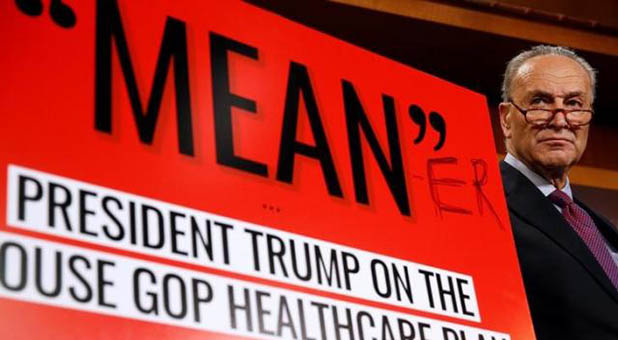Democrats Don’t Seem Too Interested in This Scandal
Within the arcane rules of the U.S. Senate, there is one that prohibits committees from holding hearings after the second hour of business during the day.
It’s a rule that hasn’t been used in a very long time, that is until recently. The Senate Judiciary Committee planned to meet Wednesday for a hearing into the “unmasking” of U.S. citizens—particularly members of President Donald Trump’s campaign staff—by the Intelligence Community, possibly for political reasons. But Minority Leader Chuck Schumer, D-N.Y., invoke the so-called “two-hour rule” to prevent the hearing.
The committee’s chairman, Sen. Chuck Grassley, R-Iowa, was incensed by the move.
“The federal government’s primary responsibility is to protect the American people, so it’s unbelievable that the minority leader would block senators from both parties from holding a national security briefing to examine our nation’s most critical tools to protect the homeland,” he said. “Today, the Judiciary Committee was set to hear from senior intelligence officials about highly sensitive intelligence gathering authorities that will soon require action from Congress.
“It’s disturbing and reckless for the minority leader to block the briefing. We’ve seen too many recent reminders of how unsafe the world is today. This is no time to play politics with our national security.”
Apparently, it’s not the first time Minority Leader Chuck Schumer, D-N.Y., has used the rule to obstruct committee business related to this investigation.
In a statement to the media Wednesday, Grassley’s office stated:
Over the last two weeks, Minority Leader Chuck Schumer, D-N.Y., has abused a rarely-used procedural tool to block Senate committee business from taking place two hours after the Senate convenes session for the day. Grassley rebuked Schumer last week for using the same tactics, which cut short a hearing on free speech, blocked a hearing on Russian interference in the U.S. democratic process and cancelled a markup to advance bipartisan anti-human trafficking legislation.
The investigation into the matter continues, although it’s unclear when the hearing will be rescheduled. In the meantime, Grassley and Sen. Lindsey Graham, R-S.C., have requested additional information regarding the unmasking scandal.
In a letter to Deputy Attorney General Rod Rosenstein, they have requested all proposed and final applications for surveillance warrants that the FBI reportedly sought from the Foreign Intelligence Surveillance Court in the investigation into Russian interference in the 2016 elections. This includes any applications submitted in the FBI’s investigation into alleged collusion between Russia and Trump campaign associates.
The letter states:
The 2016 FISC Report, which provides annual statistics about the Court’s actions in general, states that in 2016 the FISC denied nine applications or certifications, and denied in part or modified 365 orders. While the 2016 FISC Report provides Congress and the public this information, it does not report “any modifications made by the government to [a proposed] application or certification that it had submitted pursuant to Rule 9(a).” While we understand that this may be part of a routine FISC process, it is important for the Committee to understand fully the context of and basis for requests to the FISC related to this particular matter. We have some reason to believe these processes have been used in these investigations. For example, on January 11, 2017, the Guardian reported that:
[T]he FBI applied for a warrant from the foreign intelligence surveillance court (FISA) over the summer in order to monitor four members of the Trump team suspected of irregular contact with Russian officials. The FISA court turned down the application asking FBI counter-intelligence investigators to narrow its focus.
The next day, the BBC stated that Justice Department attorneys involved in the investigation of Russian election interference submitted a FISA application to the FISC focused on two Russian banks, reporting:
Their first application, in June, was rejected outright by the judge. They returned with a more narrowly drawn order in July and were rejected again.
There have been subsequent media reports claiming the FBI submitted and received approval of a FISA application in the investigation that was based on the political opposition research dossier. {eoa}















































